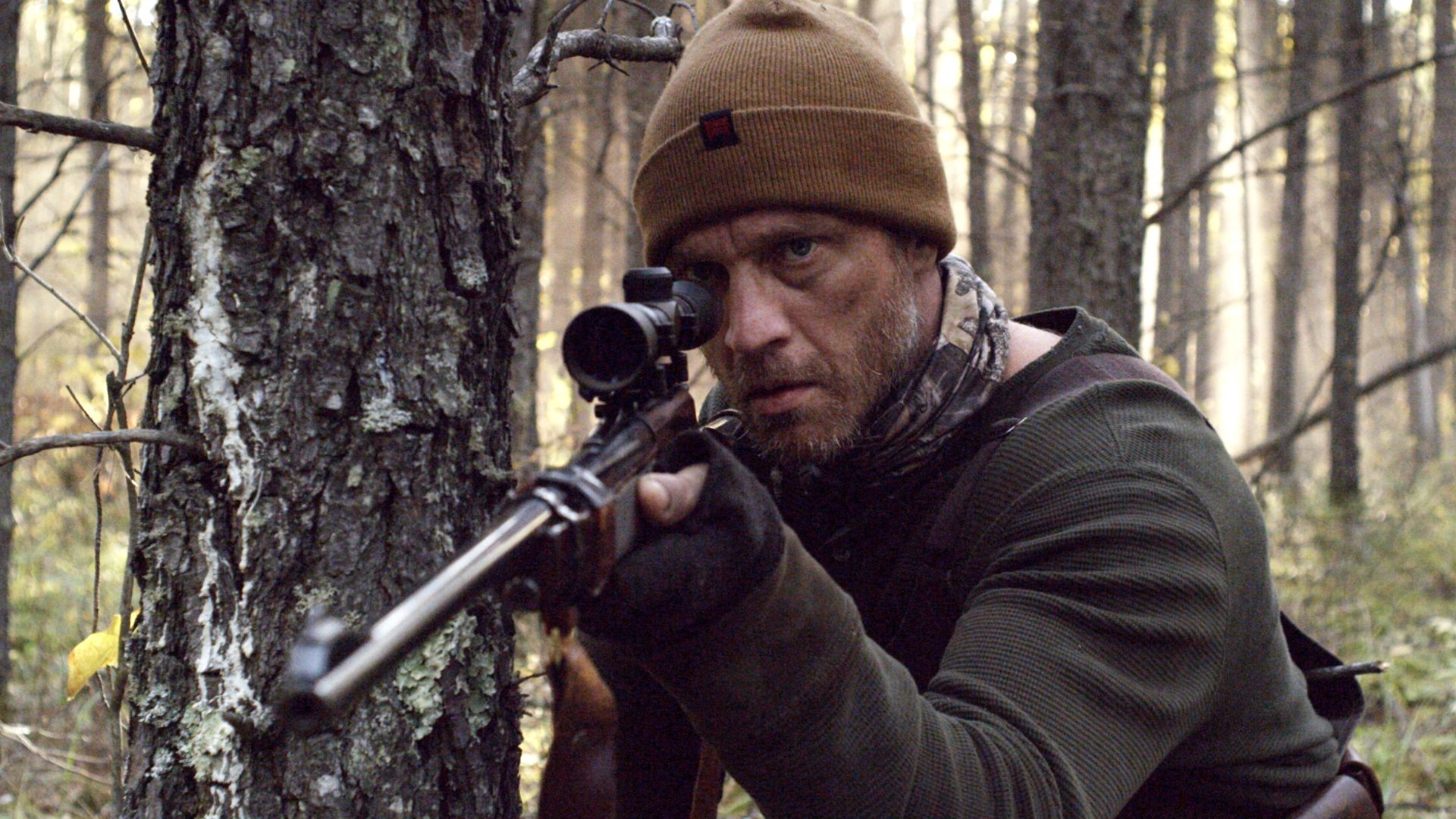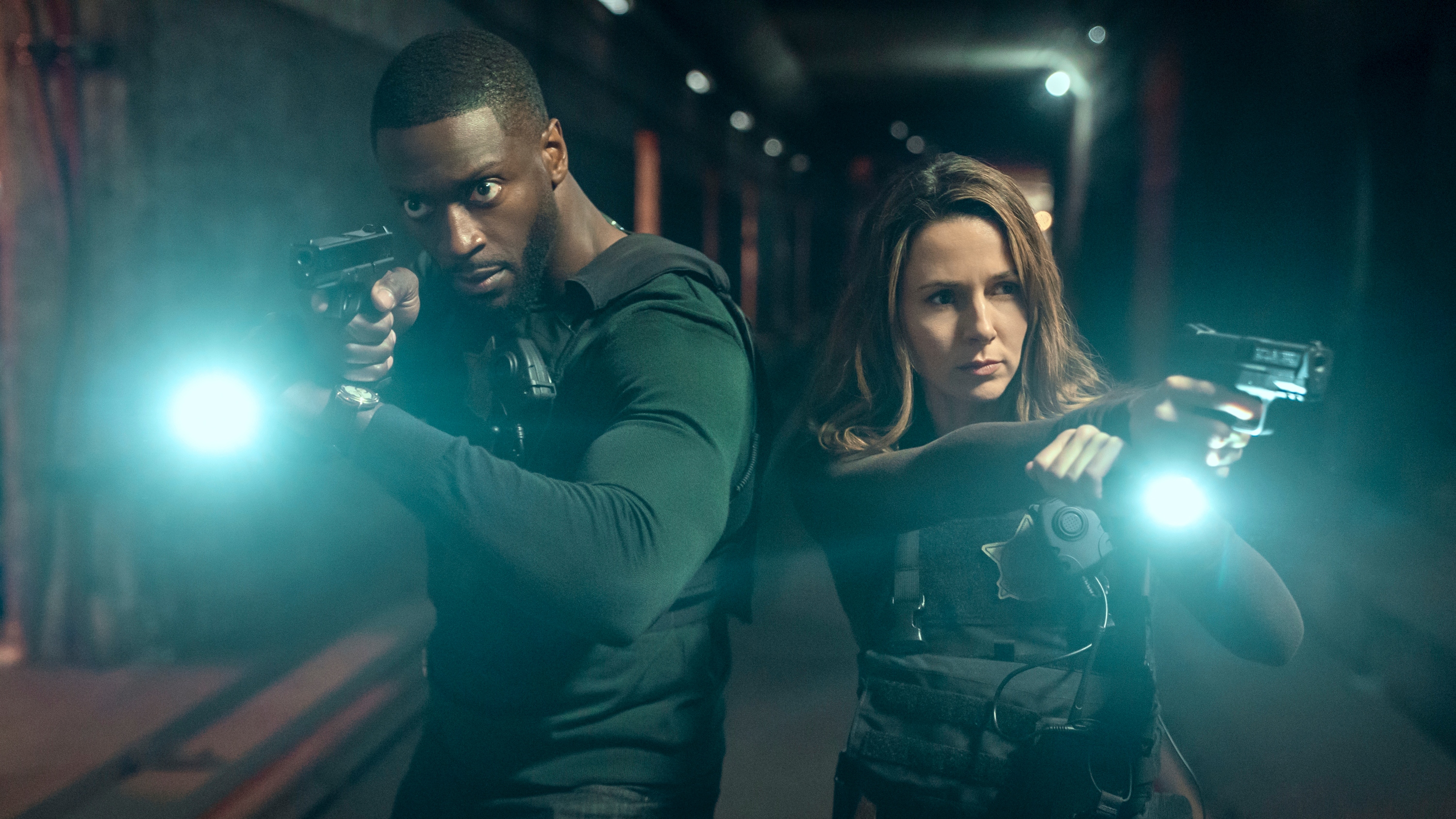What to Watch Verdict
'Hunter Hunter' is a thrilling-in-spurts standoff about how evil still finds those who lock themselves away, and rightly wonders if shutting away is useful protection.
Pros
- +
🐺 Summer H. Howell's locked-away child.
- +
🐺 Camille Sullivan as a mom on the edge.
- +
🐺 That ending, boy howdy.
Cons
- -
🐺 Finishes strong, builds just fine.
- -
🐺 Supporting characters are thinner.
- -
🐺 Might not be everyone's speed.
As humanity evolved, as troglodytes went from clubbing sabertooths to wearing Bluetooths, those who feared civilizations' advancing temptations stayed dedicated to their primitive ways. In Shawn Linden's Hunter Hunter, we're meant to understand how primeval our existences still are behind WiFi signals, supermarkets, and other modern conveniences. While progress marches forward, there are still those left behind by their own choices. The horrors depicted in this woodland wildlife stalker are overt come the third act and coincide with paranoias of futurism or societal dependencies as perceived by pelt-bundled hunters stoking outdated mindsets. It's raw, wrought with predatory focus, and while exceptionally simplistic, still cuts to the bone in its grisly closing minutes.
Joseph Mersault (Devon Sawa), his wife Anne (Camille Sullivan), and daughter Renee (Summer H. Howell) live isolated lifestyles as fur trappers. They hunt, forage, and rely on Mother Nature for their supplies. When a rogue wolf starts snatching animals from the family's traps, Joseph ventures into the surrounding forestation to eliminate his four-legged foe. Anne and Renne stay behind, keeping up with Renee's home education, but worries mount when Joseph stops answering his radio. Then Anne discovers a wounded man close to their property (Lou, played by Nick Stahl), who she drags into their living room to provide first aid. Another victim of the rascally wolf? Or someone who knows Joseph's whereabouts and isn't telling.
The minimalist nature of Hunter Hunter is both its fiercest attribute and a restrictive holster. There's plenty to be feared in a standoff between man and beast, the latter untamed, snarling at its intended prey. Likewise, supporting characters feel underdeveloped given how this is a story about Joseph's family, the alpha stealing their nourishment, and wanderer Lou. Municipal ranger Barthes (Gabriel Daniels) deals with bougie troublemakers from the city who don't abide by rural ordinances, yet his integration into a pivotal plot moment doesn't pack the punch intended given muted arcs. Even at ninety minutes, there's a deficiency in the film's insistence behind Joseph's commitment to living a tranquil tracker's life beyond inheritance and heritage. Maybe that'll strike harder for some.
Of course, a lot of what I adore about Hunter Hunter, and thus can't divulge, punctuates a ferocious finale. There's a conscious effort to blend possibly-supernatural influences with otherwise true-crime depravity à la The Wolf Of Snow Hollow that's more proficient in Linden's exercise. Also, I'd be remiss not to mention parallels to Martyrs that use gruesomeness to emphasize a character's rage and detachment in another genre-savage moment of cruel catharsis. Linden crams the back-end of Hunter Hunter with a fireworks display of painful pops in rapid succession, at the expense of contrasting against a backstory that's less exciting and more survivalist. The juxtaposition works in visual cues, charting Anne and Renee's actions as the situation becomes ever-so dire, but reveals how tranquility might be a bit softer than required in preceding sequences.
Of all the dynamics at play, the most vital narrative portrayal is that of Renee's shortcomings as a prisoner-of-circumstance adolescent who only knows her father's tracking techniques. Summer H. Howell plays her version of a domesticated cub, asking questions about literature and math that go unanswered while displaying immaturity due to lacking social influences. Hunter Hunter is a thoughtful depiction of writing another's destiny despite the violence, torn mammal limbs, and snapped bunny necks. Older generations unintentionally hinder their offspring by demanding adherence to normalized practices now bygone. Linden is playing with nature versus nurture themes (nature as an ecosystem) in both subtle and amplified ways, along with the instinctual baseness of evil actions. Still, the closing minutes aside, I'm most impressed by Howell's embodiment of childhoods lost and hereditary failures. It's a choice to keep Renee caged, one that suffers consequences.
Hunter Hunter is as quiet as the riverbeds and leaf-covered pathways that define Shawn Linden's ode to the pioneer for a long stretch. A blessing that allows the necessity for independent skillsets and curse to those struggling with affordable alternatives available, as dangers present themselves in furry coats or flesh. It's an easy watch, and Sawa's conviction sets the stage for ponderous questions as to why someone might dedicate themselves to such rustic practices. Then bleakness and dread sets in, slicing through dead-air for a third act that redeems those lying in wait for the true vileness of Hunter Hunter to pounce.
Hunter Hunter will be available on VOD December 18th, 2020.
The latest updates, reviews and unmissable series to watch and more!
- The best Amazon Prime movies
- Amazon is right: You don't own your digital media
- The best shows on Amazon Prime
- New movies on Amazon Prime
Matt Donato is a Rotten Tomatoes approved film critic who stays up too late typing words for What To Watch, IGN, Paste, Bloody Disgusting, Fangoria and countless other publications. He is a member of Critics Choice and co-hosts a weekly livestream with Perri Nemiroff called the Merri Hour. You probably shouldn't feed him after midnight, just to be safe.


